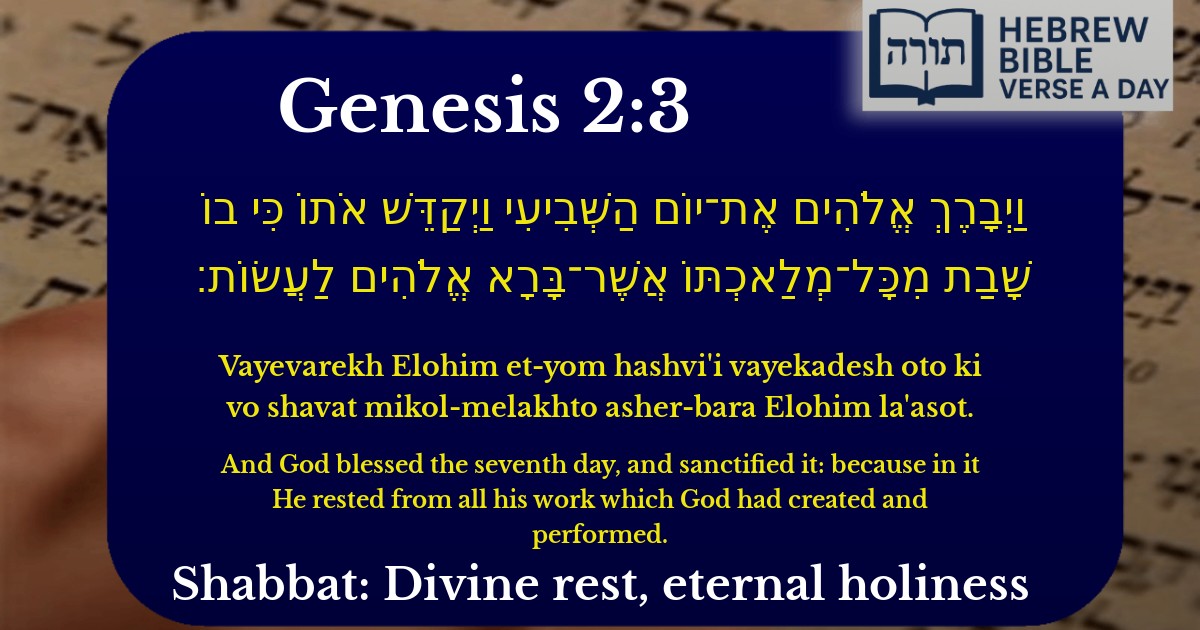Join Our Newsletter To Be Informed When New Videos Are Posted
Join the thousands of fellow Studends who rely on our videos to learn how to read the bible in Hebrew for free!
Hebrew Text
וַיְבָרֶךְ אֱלֹהִים אֶת־יוֹם הַשְּׁבִיעִי וַיְקַדֵּשׁ אֹתוֹ כִּי בוֹ שָׁבַת מִכָּל־מְלַאכְתּוֹ אֲשֶׁר־בָּרָא אֱלֹהִים לַעֲשׂוֹת׃
English Translation
And God blessed the seventh day, and sanctified it: because in it He rested from all his work which God had created and performed.
Transliteration
Vayevarekh Elohim et-yom hashvi'i vayekadesh oto ki vo shavat mikol-melakhto asher-bara Elohim la'asot.
Hebrew Leining Text
וַיְבָ֤רֶךְ אֱלֹהִים֙ אֶת־י֣וֹם הַשְּׁבִיעִ֔י וַיְקַדֵּ֖שׁ אֹת֑וֹ כִּ֣י ב֤וֹ שָׁבַת֙ מִכׇּל־מְלַאכְתּ֔וֹ אֲשֶׁר־בָּרָ֥א אֱלֹהִ֖ים לַעֲשֽׂוֹת׃ <span class="mam-spi-pe">{פ}</span><br>
וַיְבָ֤רֶךְ אֱלֹהִים֙ אֶת־י֣וֹם הַשְּׁבִיעִ֔י וַיְקַדֵּ֖שׁ אֹת֑וֹ כִּ֣י ב֤וֹ שָׁבַת֙ מִכׇּל־מְלַאכְתּ֔וֹ אֲשֶׁר־בָּרָ֥א אֱלֹהִ֖ים לַעֲשֽׂוֹת׃ {פ}
🎵 Listen to leining
Parasha Commentary
📚 Talmud Citations
This verse is quoted in the Talmud.
📖 Shabbat 10b
The verse is referenced in the discussion about the sanctity of the Sabbath and how God blessed and sanctified the seventh day.
📖 Megillah 9a
The verse is mentioned in the context of the translation of the Torah into Greek and the significance of the Sabbath.
📖 Chagigah 12a
The verse is cited in a discussion about the creation of the world and the sanctification of the Sabbath.


The Blessing of the Seventh Day
The verse states, "וַיְבָרֶךְ אֱלֹהִים אֶת־יוֹם הַשְּׁבִיעִי" ("And God blessed the seventh day"). Rashi explains that the blessing refers to the manna in the wilderness, where a double portion fell on Friday (Exodus 16:22), enabling the Israelites to observe Shabbat without gathering food. This demonstrates that Hashem provides sustenance to those who sanctify Shabbat.
The Sanctification of Shabbat
The verse continues, "וַיְקַדֵּשׁ אֹתוֹ" ("and sanctified it"). The Rambam (Hilchot Shabbat 29:1) teaches that this sanctification was eternal, establishing Shabbat as a day set apart for holiness. The Midrash (Bereishit Rabbah 11:2) elaborates that Hashem imbued the seventh day with a unique spiritual quality, making it inherently holy for all generations.
The Reason for Shabbat's Sanctity
The verse concludes, "כִּי בוֹ שָׁבַת מִכָּל־מְלַאכְתּוֹ" ("because in it He rested from all His work"). The Talmud (Beitza 16a) explains that "rest" does not imply physical fatigue—as Hashem is beyond such limitations—but rather a cessation of creative activity. The Sforno adds that this cessation serves as a model for humanity, teaching us to emulate Hashem by withdrawing from mundane labor to focus on spiritual elevation.
Key Teachings from the Verse